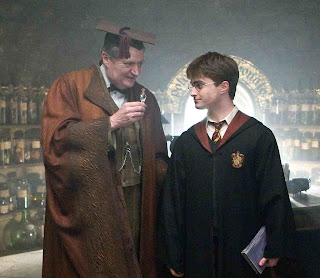 Precious is a film riddled with so much sadness that it would be easier to believe it if it were true. Based on the book Push, the protagonist is an amalgamation of various young women the author, Sapphire, met when she was teaching in Harlem during the mid-80's. Any one point of the girls' depressing life would make do for a fine drama, but when you combine her mothers' physical abuse, her fathers' sexual abuse, her pregnancies due to her fathers' sexual abuse, her lack of education, her obesity, her dire straits living off of welfare in Harlem...one begins to wonder if anything can get worse for poor Precious (and it does). Now, we could speculate that one point leads to the next: her parents' character might suggest a life of destitution, destitution generally offers a neglected education, pallid nutrition and so on and so forth. And we can assume that there are many young women who find themselves in similar situations. But I have not felt so much despair in a film since Schindler's List and because this film is not about a true life event, like the Holocaust, you're left wondering if you're not being emotionally manipulated for the sake of the film's resolve.
Precious is a film riddled with so much sadness that it would be easier to believe it if it were true. Based on the book Push, the protagonist is an amalgamation of various young women the author, Sapphire, met when she was teaching in Harlem during the mid-80's. Any one point of the girls' depressing life would make do for a fine drama, but when you combine her mothers' physical abuse, her fathers' sexual abuse, her pregnancies due to her fathers' sexual abuse, her lack of education, her obesity, her dire straits living off of welfare in Harlem...one begins to wonder if anything can get worse for poor Precious (and it does). Now, we could speculate that one point leads to the next: her parents' character might suggest a life of destitution, destitution generally offers a neglected education, pallid nutrition and so on and so forth. And we can assume that there are many young women who find themselves in similar situations. But I have not felt so much despair in a film since Schindler's List and because this film is not about a true life event, like the Holocaust, you're left wondering if you're not being emotionally manipulated for the sake of the film's resolve.This can all be excused, however, because the melodrama sets up a great character, superb acting and nearly flawless direction on the part of Lee Daniels, whose production credits include Monster's Ball and The Woodsman. Gabourey Sidibe has made a wonderful debut with her subtle characterization of Precious and grounds this story in the frank realism it needs. But Mo'Nique steals the show as Precious' mother, a neurotic self-absorbed nihilist of a woman, whose physical and mental abuse knows no bounds. Mo'Nique plays the character with just enough flair to reveal her dysfunction without over sensationalizing it and her final scene has Oscar written all over it. Paula Patton, Mariah Carrey and Lenny Kravitz also put in graceful performances as a teacher, social worker and nurse, respectively, who all offer Precious a slice of what life might and ought to be.
 Lee Daniels, in his sophomoric directorial effort, takes a screenplay from newcomer Geoffrey Fletcher, and gives it an energy that ought not to exist in a film with such depressing subject matter. That anyone could find something to smile about in this film is a credit to both Fletcher and Daniels. Executive producers Oprah Winfrey & Tyler Perry, not known for being shy about developing stories around strong black women, have not had a character with so much empathy and suffering, since Oprah herself played Sethe in Beloved.
Lee Daniels, in his sophomoric directorial effort, takes a screenplay from newcomer Geoffrey Fletcher, and gives it an energy that ought not to exist in a film with such depressing subject matter. That anyone could find something to smile about in this film is a credit to both Fletcher and Daniels. Executive producers Oprah Winfrey & Tyler Perry, not known for being shy about developing stories around strong black women, have not had a character with so much empathy and suffering, since Oprah herself played Sethe in Beloved.There is a minimal amount of hope offered at the end of the film, just enough to get us and Precious on by. If such a young woman exists in the real world, Harlem or otherwise, I hope that this film can be, at the very least, a testament to the idea that, although we must make do with what is given to us, the outcome of our lives is not necessarily bound to the situations we find ourselves in.
****1/2 (out of five)











